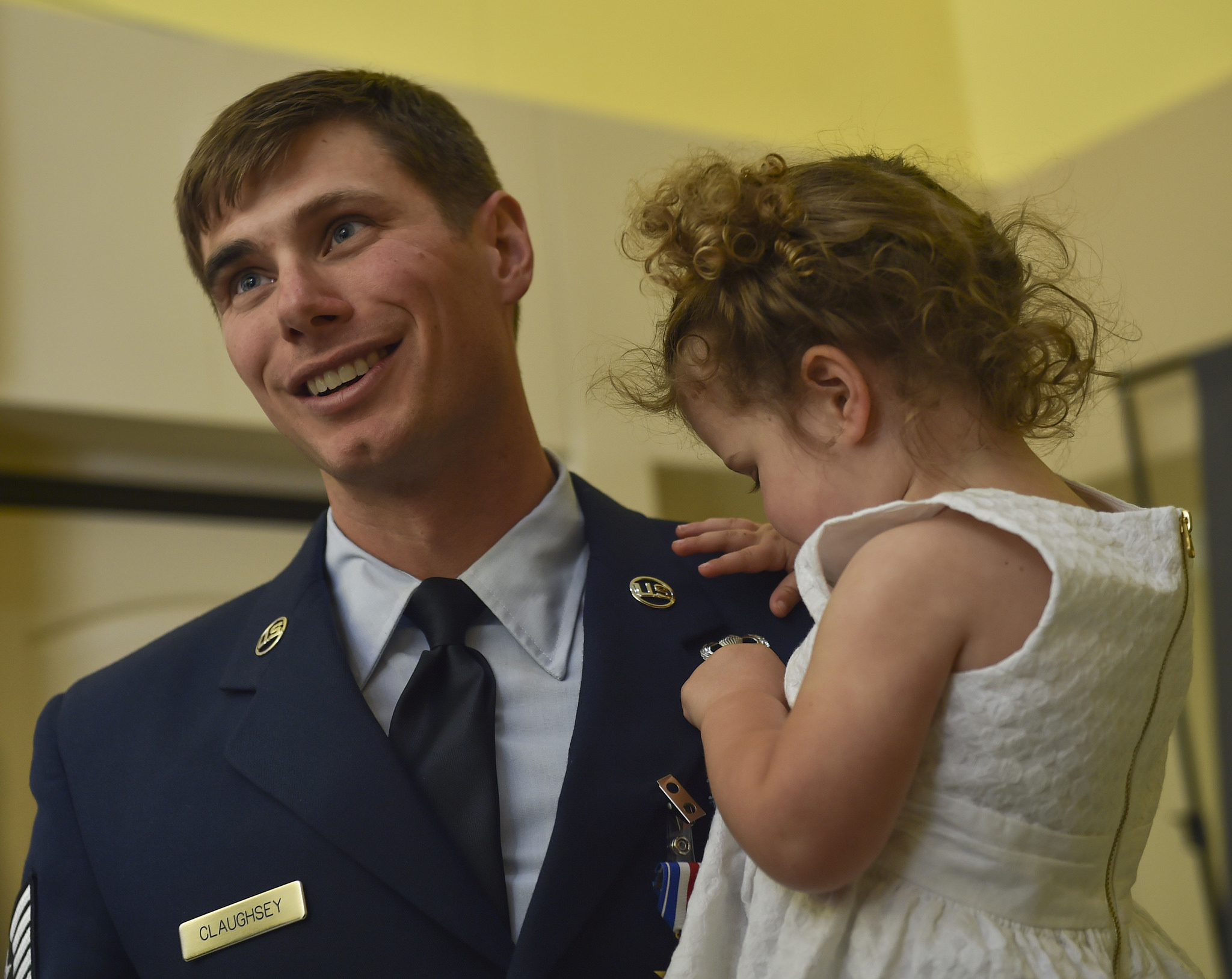
Caption: TSgt. Brian Claughsey, a combat controller with the 21st Special Tactics Squadron, received a Silver Star medal April 7, 2017, at Pope Army Airfield, NC. Air Force photo by SrA. Ryan Conroy.
Eighteen months after engaging in a 96-hour-long battle in Afghanistan, TSgt. Brian Claughsey received a Silver Star Medal on April 7.
Claughsey, a combat controller with the 21st Special Tactics Squadron, achieved his valor for his part in liberating Kunduz City, Afghanistan, over four days—Sept. 30 to Oct. 4, 2015— including as many ambushes, 17 airstrikes, and “the eventual safety of a 150-person team,” according to the Air Force.
The night before it all went down, Claughsey, who was a staff sergeant at the time, got word an airfield in Kunduz got taken by the Taliban. By morning, the whole city had fallen into Taliban hands. Claughsey’s team’s mission: Liberate Kunduz. With light-colored pickup trucks in tow thanks to the Afghan Army and humvees belonging to the Army Special Forces, the team led a 50-vehicle convoy into the city.
“As we passed the airfield, civilians were leaving in droves, which is a telltale sign that the Taliban took over,” Claughsey said in the release. “The state of the city upon infiltration was completely desolate, with the exception of the Taliban.”
The first ambush came from a fortified building, onto which Claughsey coordinated an AC-130 gunship strike, suppressing its fire. Henceforth, Claughsey kept on similar coordination, notifying aircraft where to strike ground forces.
“The entire route was covered with Taliban forces, so there were several strikes along the way—one of the strikes was about 70 meters from friendly forces,” Claughsey said in the release. “The AC-130 did a phenomenal job of putting those rounds down and keeping us safe and allowing us to continue on.”
Soon an explosive device would force the convoy to halt.
“Claughsey’s vehicle was at a four-way intersection and came under fire from two different machine gun locations at close distance. While Claughsey fought back with his personal weapon, two Special Forces soldiers in an all-terrain vehicle mounted with an M-240B machine gun put themselves between Claughsey’s vehicle to protect and suppress the ambush,” the release reads. Claughsey called those two soldiers—who also received Silver Star medals for their actions—the “the only reason we survived that ambush.” Once the enemy was fleeing, a further AC-130 strike Claughsey had called in “eliminated the threat,” the release states.
Though the team secured a police compound, it took attacks over the next 96 hours from enemy fire. While there, a call came in from a Special Forces unit about “accurate and relentless mortar, grenade launcher, and small arms fire” bombarding it.
“All that was going through my mind was that those guys needed my help and we’re all out there together as a team,” Claughsey said in the release. “I can’t do my job without them and vice versa.”
Coordinating with F-16 Fighting Falcon fighter jets and controlled strafing runs from approximately 140 meters away, Claughsey was able to neutralize that enemy force. Hours later, the Taliban attacked the police compound from three fronts, forcing Claughsey to the roof to coordinate airstrikes, “willingly [putting] himself in harm’s way,” according to the release.
“I was exhausted…it was a four-day firefight; however, at a certain point, your training kicks in and takes over,” he said. “This wasn’t the first time that I hadn’t slept or been stressed out for four days straight—our training pipeline is two years and it does a really good job of building resiliency and putting you in stressful situations so you can immediately adapt to the situation.”
With small arms rounds pecking away meters away from him, “Claughsey controlled two danger-close 500-pound bombs within 185 meters of friendly fighting positions, effectively stopping the onslaught of enemy forces on the compound—and ending the fight to liberate Kunduz,” according to the release.
Claughsey’s actions ensured the safety of the 36 US Army Special Forces personnel and 110 Afghan partner forces.
He adds his earned valor—the third highest of its sort in the US—to a litany of similar achievements the 21st STS boasts, including five of the nine Air Force Crosses given since 9/11.
